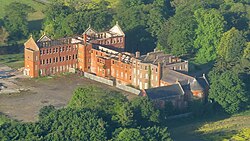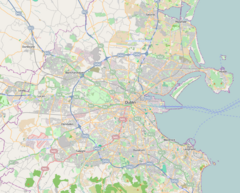| Belcamp House | |
|---|---|
 Belcamp House in 2015 | |
| Alternative names | Belcamp Hall |
| General information | |
| Status | Derelict |
| Type | Former House and school |
| Architectural style | Georgian |
| Town or city | Coolock, Dublin 17 |
| Country | Ireland |
| Coordinates | 53°24′27″N6°11′15″W / 53.407597°N 6.187444°W |
| Estimated completion | Main house (1785) School buildings (early 1900s) |
| Technical details | |
| Material | Red brick, rusticated granite |
| Floor count | 3 |
| Design and construction | |
| Architect(s) | James Hoban |
| Developer | Sir Edward Newenham |
| Website | |
| www.belcamp.ie | |
Belcamp House (sometimes Belcamp Hall) is a Georgian house and former school, situated within a substantial estate off the Malahide Road in Balgriffin in the northern suburbs of Dublin, Ireland. The house is usually attributed to the architect James Hoban, who also designed the White House in Washington, D.C., with a similar Oval Office utilising the bow back of the building.
